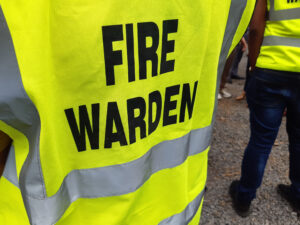
Fire incidents can happen in any workplace that poses serious risks to businesses and organisations, both in terms of fatalities, injuries and damaging property.
There are nearly 22,200 fires and 17 fatalities that occur due to fire incidents, according to a study. Out of which around 5000 of these fires are set purposely, and the remaining are recognised as accidental.
These types of unintended fires can be preventable if those responsible for fire safety like fire wardens at work have appropriate procedures and measures in place to mitigate the fire risks within the organisation.
This blog post will outline the essential roles and responsibilities of a fire warden in the workplace to avoid fire hazards and ensure everyone’s safety at work.
Alongside this, it also explores the current legislation that highlights employers’ responsibility for having a responsible person in charge of fire safety at work.
What is a Fire Warden?
A fire warden or a marshal is a competent person who has been appointed to undertake measures to prevent fire risks and hazards at work.
According to the Regulatory Reform (Fire Safety) 2005, it is a legal requirement for the responsible person (individual responsible for fire safety) to appoint one or more competent persons to assist them in implementing control measures to mitigate the fire risks.
Roles & Responsibilities of Fire Wardens
The roles and duties of fire warden will vary depending on the workplace environment, nature and size of the premises. But the overall responsibilities remain unchanged. Some of these are:
Checking Fire Alarms
The first and the most important duty of a fire warden involve checking the fire alarms for proper functioning to ensure their working order and clear visibility.
Checking Emergency Exists
Ensuring the emergency exits are clear of obstructions and can be easily opened in an emergency.
Fire Extinguishers
Ensuring the availability and visibility of fire extinguishers as well as they are regularly serviced.
Emergency Lighting
Ensuring that the emergency lighting is functional and is checked regularly every month to make sure it is in good working order.
Adequate Fire Safety Signs
Ensuring the clear visibility of appropriate fire safety signposts and making sure they are fixed firmly on the wall
General Housekeeping Practices
Ensuring the implementation of general housekeeping practices like the sources of heat kept apart from the sources of fuel. The hazardous, combustible and flammable materials are kept and stored safely.
Electrical Equipment
Ensuring all the electrical equipment is PAT testing and should not be faulty. As faulty devices can cause a fire in the workplace.
Maintaining Records
Ensuring all the fire safety activities are regularly recorded to identify any hazard and implement the necessary control measures to eliminate those risks. It ensures compliance as well as the fulfillment of safety procedures.
Staff Induction
Ensuring that the staff members have adequate fire safety training. It should be a part of induction training for the new employees and must be refreshed every year for all the staff to comply with the law and ensure workplace safety.
Legal Requirement for Having a Fire Warden
The UK legislation requires every business or organisation to appoint fire wardens. The number of fire wardens in an organisation depends on several factors. But it is advisable to have fire wardens cover a large or complex floor.
Other factors may vary depending on the size of the premises, the number of workers employed and the type of business.
But the employers must consider a few key things while appointing fire wardens at their workplace:
If any individual is at high risk, then you need to increase the number of fire wardens in the premises
When a fire warden is on leave, then an alternative warden should be present in place
Fire warders need to be on-site when there are people present at work
Fire Warden Training
While considering the roles and responsibilities of fire wardens. It is also a legal requirement for employers to provide adequate instruction, guidance and fire warden training to their personnel.
Such a training course helps organisations and their individuals to comply with the law as well as implement procedures and practices to ensure a safe working environment.
Conclusion
Fire hazards at work can result in damage to businesses in terms of injuries, lives and properties. This can cause legal and moral claims to organisations if proper procedures and practices are not followed.
Fire wardens play a vital role in controlling and minimizing such fire hazards, and this post explains their key roles and responsibilities to ensure a safe working environment.
Read more:
Fire Warden Responsibilities in the Workplace




